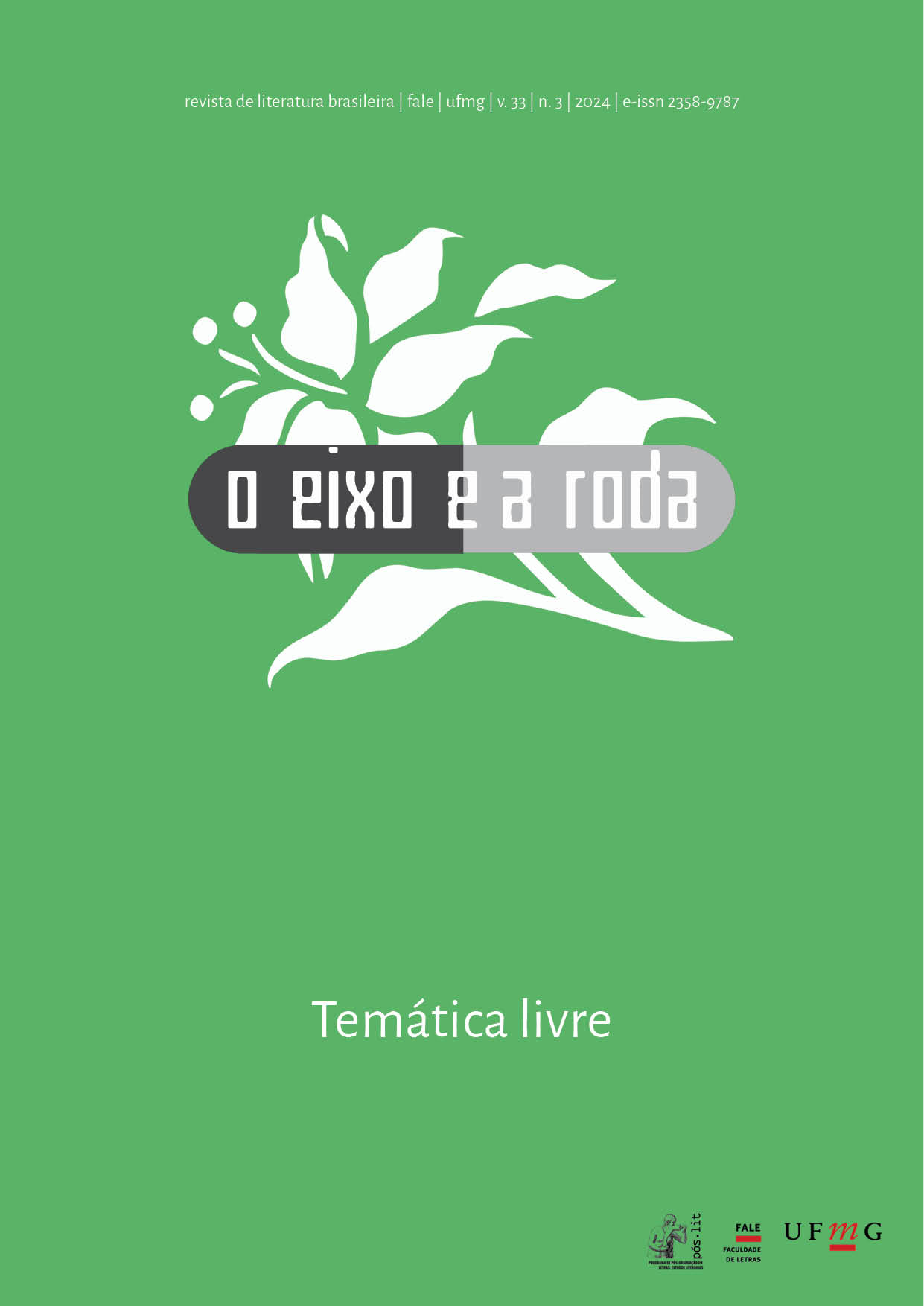On trips and returns
space and homoeroticism in Nossos Ossos, by Marcelino Freire
Keywords:
displacement, queer body, Marcelino Freire, contemporary Brazilian narrativeAbstract
This article presents a reflection on the displacement of the narrator-protagonist Heleno, from the novel Nosso Ossos, by Marcelino Freire. Therefore, the hypothesis is defended that the novel in question articulates the figure of travel to the possibility of identity (self)knowledge, insofar as desires, estrangements and contact with others produce dissensions, ruptures, agencies and new itineraries. The narrator Heleno undertakes a journey of spatial displacement, but also a journey of personal and subjective learning. It is a body that presents discordant marks and discourses dissonant with those formulated about an ideal body, being relegated to the space of the abject and, therefore, demands recognition as an integral part of different social spaces. Furthermore, talking about queer bodies and mobility in literature implies a subversion of conventional standards in literary production, since such displaced bodies belong to narratives that were, at times, left on the margins of literary criticism. The discussion is based on the propositions of Doreen Massey (2015), Louro (2020), Butler (2000, 2019), among others.
Downloads
References
ALMEIDA, Sandra Regina Goulart. Cartografias contemporâneas: espaço, corpo, escrita. Rio de Janeiro: 7 letras, 2015.
BARCELLOS, José Carlos. Literatura e homoerotismo em questão. Rio de Janeiro: Dialogarts, 2006.
BUTLER, Judith. Corpos que importam: os limites discursivos do “sexo”. Trad. Veronica Daminelli e Daniel Yago Françoli. São Paulo: n-1edições, 2019.
BUTLER, Judith. Corpos que pesam: sobre os limites discursivos do “sexo”. In: LOURO, Guacira Lopes (Org.). O corpo educado: pedagogias da sexualidade. Tradução de Tomaz Tadeu da Silva. Belo Horizonte: Autêntica, 2000, p. 151-165.
BUTLER, Judith. Problemas de gênero: feminismo e subversão da identidade. Trad. Renato Aguiar. Rio de Janeiro: Civilização Brasileira, 2008.
CARDOSO, S. O olhar viajante (do etnólogo). In: NOVAES, A. (org.). O olhar. São Paulo: Companhia das Letras, 1995. p. 347-360.
DALCASTAGNÈ, Regina. Literatura brasileira contemporânea: um território contestado. Vinhedo: Editora Horizonte, 2012.
FOUCAULT, Michel. História da sexualidade I: a vontade de saber. Trad. Maria Theresa da Costa Albuquerque. Rio de Janeiro: Paz & Terra, 2010.
FOUCAULT, Michel. Microfísica do poder. Trad. Roberto Machado. Rio de Janeiro: Paz & Terra, 2019.
FOUCAULT, Michel. Vigiar e punir: nascimento da prisão. Trad. Raquel Ramalhete. Petrópolis, RJ: Vozes, 2014.
GENETTE, Gérard. Discurso da narrativa. Trad. Maria Alzira Seixo. Lisboa: Veja, 1995.
IANNI, Octavio. A metáfora da viagem. In: _____. Enigmas da modernidade-mundo. Rio de Janeiro: Civilização Brasileira, 2003, p. 11-31.
LOURO, Guacira Lopes. Um corpo estranho: ensaios sobre sexualidade e teoria queer. Belo Horizonte: Autêntica, 2020.
MASSEY, Doreen. Pelo espaço: uma nova política da espacialidade. Trad. Hilda Pareto Maciel. Rio de Janeiro: Bertrand Brasil, 2015.
MASSEY, Doreen. Space, Place and Gender. Minneapolis: University of Minnesota Press, 1994.
REIS, Carlos.; LOPES, Ana Cristina M. Dicionário de teoria da narrativa. São Paulo: Editora Ática S. A, 1988.




 Esta obra está licenciada com uma Licença
Esta obra está licenciada com uma Licença 